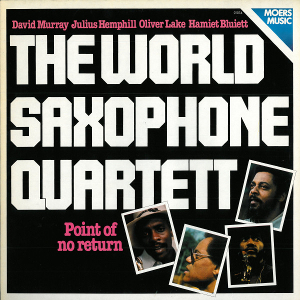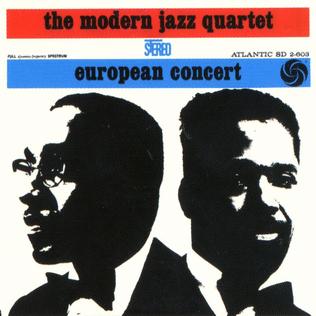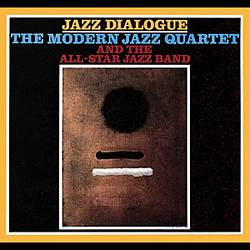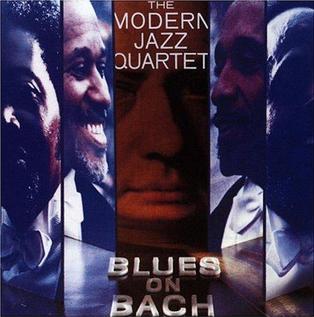
John Aaron Lewis was an American jazz pianist, composer and arranger, best known as the founder and musical director of the Modern Jazz Quartet.

The Modern Jazz Quartet (MJQ) was a jazz combo established in 1952 that played music influenced by classical, cool jazz, blues and bebop. The Quartet consisted of John Lewis (piano), Milt Jackson (vibraphone), Percy Heath, and various drummers, most notably Kenny Clarke and Connie Kay. The group grew out of the rhythm section of Dizzy Gillespie's big band from 1946 to 1948, which consisted of Lewis, Jackson, and Clarke along with bassist Ray Brown. They recorded as the Milt Jackson Quartet in 1951 and Brown left the group, being replaced on bass by Heath. During the early-to-mid-1950s they became the Modern Jazz Quartet, Lewis became the group's musical director, and they made several recordings with Prestige Records, including the original versions of their two best-known compositions, Lewis's "Django" and Jackson's "Bags' Groove". Clarke left the group in 1955 and was replaced as drummer by Kay, and in 1956 they moved to Atlantic Records and made their first tour to Europe.

Selflessness Featuring My Favorite Things is a posthumous album by jazz musician John Coltrane, released in 1969. The album juxtaposes two tracks recorded live at the 1963 Newport Jazz Festival with a single track ("Selflessness") recorded in a studio in Los Angeles in 1965.

Fontessa is a 1956 album by the Modern Jazz Quartet released on Atlantic Records. It was the first of their albums released on Atlantic. The album was released in the USA in mono on the black Atlantic label with catalogue number 1231. It was released in the USA in stereo on the green Atlantic label with catalogue number SD 1231. The prefix SD stands for Stereo Disc. The current internationally available CD release is the mono version. A Japanese CD exists of the stereo version. Additionally both mono and stereo versions were released in many other territories, for example the UK with London LTZ-K 15022 for the mono and London SAH-K 6031 for the stereo. The 11-minute title tune by the group's pianist and musical director John Lewis was inspired by Commedia dell'arte, and the four characters depicted in it are pictured on the cover. Lewis wrote of it in the liner notes:
Fontessa is a little suite inspired by the Renaissance Commedia dell’Arte. I had particularly in mind their plays which consisted of a very sketchy plot and in which the details, the lines, etc. were improvised. This suite consists first of a short Prelude to raise the curtain and provide the theme. The first piece after the Prelude has the character of older jazz and improvised parts are by the vibraphone. This piece could perhaps be the character of Harlequin. The second piece has the character of less older jazz and the improvised parts are played by the piano. The character here could perhaps be Pierrot. The third piece is of a still later jazz character and develops the main motif. The improvised parts are by the drums. This character could perhaps be Pantaloon. The opening Prelude closes the suite. Fontessa is the three-note main motif of the suite and is perhaps a substitute for the character of Colombine.

Point of No Return is the debut album by the jazz group the World Saxophone Quartet released on the Moers Music label in 1977.

The Complete Last Concert is a double CD live album by American jazz group the Modern Jazz Quartet featuring performances recorded at Avery Fisher Hall in 1974 and released on the Atlantic label originally as a double album The Last Concert (1975) and More from the Last Concert (1981) before the complete edition was released in 1988.

Masterpieces by Ellington is the first LP album by American pianist, composer, and bandleader Duke Ellington, recorded for the Columbia label in 1950. It was one of the earliest 12-inch LPs to take advantage of the extended time available and consisted of four tracks, three of them "concert arrangements" of Ellington standards and one, "The Tattooed Bride," a recent tone poem.

Lonely Woman is an album by American jazz group the Modern Jazz Quartet featuring performances recorded in 1962 and released on the Atlantic label.

European Concert is a live album by American jazz group the Modern Jazz Quartet featuring performances recorded in Sweden in April 1960 and originally released on two consecutive volumes on the Atlantic label.

The Modern Jazz Quartet at Music Inn Volume 2 is a live album by American jazz group the Modern Jazz Quartet featuring performances recorded at the Music Inn in Lenox, Massachusetts, in 1958, with guest artist Sonny Rollins appearing on two numbers, and released on the Atlantic label.

The Modern Jazz Quartet at Music Inn is a live album by American jazz group the Modern Jazz Quartet featuring performances recorded at the Music Inn in Lenox, Massachusetts in 1956, with guest artist Jimmy Giuffre appearing on three numbers, and released on the Atlantic label.

Jazz Dialogue is an album by American jazz group the Modern Jazz Quartet with a big band featuring performances recorded in 1965 and released on the Atlantic label.

Live at the Lighthouse is a live album by American jazz group the Modern Jazz Quartet recorded by Wally Heider at the Lighthouse Café in 1967 and released on the Atlantic label.

Plastic Dreams is an album by American jazz group the Modern Jazz Quartet, augmented by a brass section on three tracks, recorded in 1971 and released on the Atlantic label.

The Legendary Profile is an album by American jazz group the Modern Jazz Quartet recorded in 1972 and released on the Atlantic label.

In Memoriam is an album by American jazz group the Modern Jazz Quartet recorded in 1973 and released on the Little David label.

Blues on Bach is an album by American jazz group the Modern Jazz Quartet recorded in 1973 and released on the Atlantic label. The album includes five arrangements by John Lewis of pieces by Johann Sebastian Bach, interspersed with four original blues pieces "on" [the name] "Bach"—in keys that spell out in order the name B-A-C-H.

Reunion at Budokan 1981 is a live album by American jazz group the Modern Jazz Quartet featuring performances recorded at their reunion concert at the Nippon Budokan in 1981 and released on the Pablo label.

Dedicated to Connie is a live album by American jazz group the Modern Jazz Quartet featuring performances recorded in Slovenia in May 1960 and released in 1995 on the Atlantic label following drummer Connie Kay's death. The album was also released by Jazz Life in 1990 as Modern Jazz Quartet In Concert.
"Django" is a 1954 jazz standard written by John Lewis as a tribute to the Belgian-born jazz guitarist Django Reinhardt. It was a signature composition of the Modern Jazz Quartet, of which Lewis was the pianist and musical director.



















